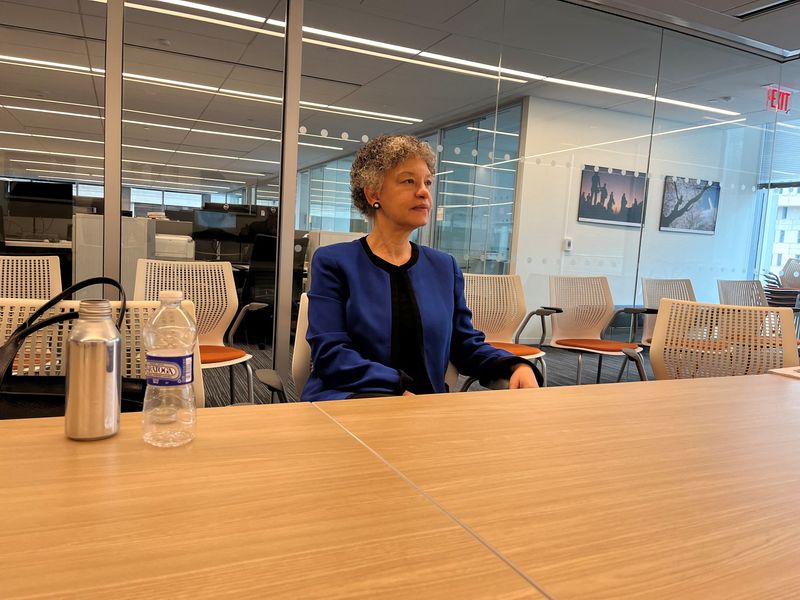Fed's Collins says latest inflation data doesn't change policy path yet
Reuters
Published Mar 31, 2023 02:54PM ET
Updated Mar 31, 2023 03:06PM ET

By Michael S. Derby
WASHINGTON (Reuters) - Boston Federal Reserve President Susan Collins said on Friday that wherever the U.S. central bank stops with its interest rate rises, maintaining that level for some time will be critical in helping to lower high inflation back to the 2% target.
Collins, speaking to Reuters after the release of a report showing a key gauge of inflationary pressures eased last month, cautioned that she doesn't yet believe the core thrust of price pressures had cooled enough to change the monetary policy outlook.
"While it is good news that the new data is not as elevated" as the last couple of months, amid some revisions downward in past data, "we still haven't made that much progress" on bringing inflation back to the 2% target, Collins said in the interview. "Where I am right now is, it doesn't really change how I've been thinking about where we are and what we have left to do" on the monetary policy front.
The Commerce Department earlier on Friday reported that the personal consumption expenditures price index rose 5% on a year-over-year basis in February, down from 5.3% in January. Excluding food and energy components, the index was up 4.6% over the same period, compared to a rise of 4.7% in January.
The Fed's aggressive rate hikes over the last year have been aimed at lowering inflation, and those increases have taken the central bank's benchmark overnight interest rate from near-zero levels to the current 4.75%-5.00% range.
In separate remarks on Thursday, Collins said Fed forecasts released last week projecting one more 25-basis-point rate hike were reasonable at the time. In her Reuters interview, however, Collins said the future of monetary policy remains very much subject to change due to the unpredictable nature of incoming data.
"There have been surprises along the way. We've certainly seen that that could happen again," Collins said.
But Collins, who took over as head of the Boston Fed last summer and who does not have a vote on the policy-setting Federal Open Market Committee this year, said one of the key things to bear in mind is that the central bank will have to hold rates at its stopping point for some time in order to get inflation down. That will be true even if upcoming data, including the release of the March jobs report, show notable cooling, she added.
"Even if there was a significant softening in the jobs report that comes in on Friday (April 7), that's really one month, and recent months have been quite strong. And so I would need to see more, which is part of why in my view, we're going to need to hold for some time," Collins said.
The key for the Fed is "to really let tighter conditions work through the economy. That's going to take some time and I think that's just a reality. I know that's frustrating to many people," she said.
Financial markets are currently pricing in a mix of rate cuts into the end of the year that Fed officials in public comments have so far refrained from endorsing.
'BIT LESS STIGMA'
Collins also reiterated in the interview that the recent stress in the banking sector, which caused her to revise down her view on how far the Fed would ultimately need to go with its rate rises, had occurred in an environment where most banks are in good shape.
She said actions by government authorities to shore up banks following the collapse of Silicon Valley Bank and Signature Bank (OTC:SBNY) earlier this month have helped instill confidence in the system, and she welcomed what's been a surge in bank borrowing from the Fed to meet liquidity needs.

Pointing to the usage of the Fed's discount window, which has been historically shunned by banks, Collins said there appeared to be a "bit less stigma" to using some of the available facilities, adding "that is reassuring."
When it comes to the borrowing from key Fed tools, which on Wednesday totaled $332.7 billion, Collins said she expected that to decline, but added that the facilities should be used to the extent that they help.
Written By: Reuters
Trading in financial instruments and/or cryptocurrencies involves high risks including the risk of losing some, or all, of your investment amount, and may not be suitable for all investors. Prices of cryptocurrencies are extremely volatile and may be affected by external factors such as financial, regulatory or political events. Trading on margin increases the financial risks.
Before deciding to trade in financial instrument or cryptocurrencies you should be fully informed of the risks and costs associated with trading the financial markets, carefully consider your investment objectives, level of experience, and risk appetite, and seek professional advice where needed.
Fusion Media would like to remind you that the data contained in this website is not necessarily real-time nor accurate. The data and prices on the website are not necessarily provided by any market or exchange, but may be provided by market makers, and so prices may not be accurate and may differ from the actual price at any given market, meaning prices are indicative and not appropriate for trading purposes. Fusion Media and any provider of the data contained in this website will not accept liability for any loss or damage as a result of your trading, or your reliance on the information contained within this website.
It is prohibited to use, store, reproduce, display, modify, transmit or distribute the data contained in this website without the explicit prior written permission of Fusion Media and/or the data provider. All intellectual property rights are reserved by the providers and/or the exchange providing the data contained in this website.
Fusion Media may be compensated by the advertisers that appear on the website, based on your interaction with the advertisements or advertisers.